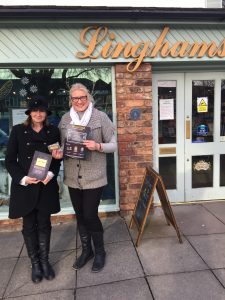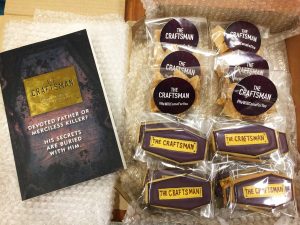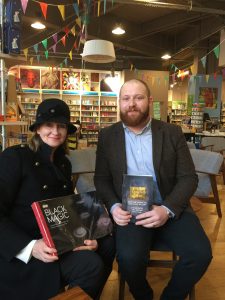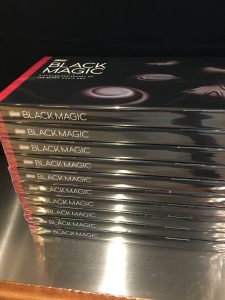We’re thrilled to announce that The Split, Sharon’s chilling new release set partly in the Antarctic, has been nominated for Thriller of the Year in the 2020 Capital Crime Amazon Publishing Readers’ Awards.
The Split has already gained plaudits from many in crime publishing and from the media, with Lee Child describing it as Sharon’s ‘best yet’ and the Financial Times calling it ‘a choice example of (Bolton’s) malevolent skill.’
The brainchild of David Headley of Goldsboro Books and crime writer Adam Hamdy, Capital Crime held its inaugural festival in 2019, quickly becoming one of the world’s largest celebrations of crime and thriller fiction with over 600 guests attending. The Amazon Publishing Reader Awards were launched that same year.
The 2020 award winners will be decided by reader vote and announced on Tuesday 13 October. Members of Capital Crime’s bookclub, or those with a Capital Crime account, can vote here.
When my son was a baby, at exactly this time of year, I was pushing his pram along one of our village roads. Horse chestnuts had started to litter the pavements and random apple trees were tossing their fruit to the ground like little missiles. It was late September, autumn at its prettiest. On the opposite side of the road two figures were engaged in conversation: one a man in middle age, the other younger, in motor-cycle clothes. As baby and I approached, they hugged, the boy donned his helmet, fired up his engine and the bike pulled away. The older man stood on the pavement, watching his son vanish.
‘Off to university,’ he called to me. ‘First time away from home.’
I’d never seen this man before, but I saw his need to share, even with a stranger, the strength of emotion he was feeling. His entire world had shifted, his son had gone.
‘Tug at the heart-strings,’ I replied, feeling for him in that moment. My own son, who’d taken so long to arrive, who’d become so indescribably precious, would one day be riding off into the sunset, hopefully not on a high-powered bike. In eighteen years I would be like this man, standing alone, fighting back tears, hoping that pain in my chest wasn’t my heart breaking. I walked on with a smile, pushing the stranger’s distress to the back of my mind, telling myself that eighteen years is a very long time.
Eighteen years is no time at all. Tomorrow we drive our beloved son Hal to his new life at Durham university and our own will never be the same again. He’ll visit, of course, for weeks at a time, but will be changed, a new man, with a life independent from ours. As the time has drawn ever closer, I’ve shut the inevitability of his departure from my mind. Face the pain I must, but not now. Not when there are clothes to be bought, bags to be packed, textbooks to be brought down from the loft, when every piece of maternal advice I’ve neglected for eighteen years has to be given, and in such a way that it’ll be taken with good humour. Not when I have to buy provisions, agree budgets, organise last minute treats and make sure he says a proper goodbye to all who wish him well.
At the same time, I’ve had to make progress on a new book, do copy-edits on That Summer, put the finishing touches to an anthology of short stories and plan for the paperback launch of The Split. I cannot do all that and grieve, and so the grieving has been on hold.
When people ask how I’ll cope I say, ‘Fine. He’s ready.’ And he is. He needs the fresh challenge of university life. He has outgrown us and his old world. He needs to make his own mistakes and find his own triumphs, away from our protection. What is happening tomorrow is right, for all of us, and that must surely help when the pain of loss comes.
I only have one real, flesh and blood child, but I’ve given birth to a few fictional ones over the years and I’m no stranger to the struggle to let go. Not yet, let me flesh out a character, polish some dialogue, add the perfect descriptive sentence. As structural edits become line edits, copy edits and then proofs, irritating mistakes appear as if by malevolent magic. When I re-read my old books (I rarely do) I see so much that I would change, given the chance.
And yet there comes a time to let go. Publishing schedules are serious; deadlines not to be taken lightly. JK Rowling, upon finishing the last Harry Potter book, said, ‘That’s it. It’s as good as I can make it.’ Authors have to know when we’ve reached that stage, when our books must stand or fall without us. And so, as I say goodbye to Hal, I do the same with That Summer. One of my problem children, it and I will never have an entirely comfortable relationship, and yet others, whose views I respect, believe it has promise and so I must trust in them, and it, and let it go.
PS: It’s done, we’re back, without him. Run swiftly, my darling boy, for you are fleet of foot and great of heart. Know that we are here always, your loudest, most embarrassing cheerleaders. You are our pride, our joy and our greatest achievement. We love you. Don’t drink too much.

By rights, I should not like wild swimming. I’m not a particularly good swimmer, never taught, other than by my dad on Sunday mornings in the local leisure centre (Darwen Baths, for those who remember it.) I certainly didn’t go to a school with its own swimming pool. My efforts never got beyond a gentle, head-up breaststroke, a far cry from the industrial-strength front-crawl that seems obligatory before venturing into open water.
I have a fear of deep water. Were my life to depend on it I could not float face down in the middle of the lake and look beneath the surface. (I’m shuddering at the very thought.) The underwater world is one that terrifies me. I have to glide over it, in a sort of pretending-it-isn’t-really-there way.
Odd things in the water spook me too: the large buoys marking swimming routes are freaky as f–k close up; should the wind urge one towards me, I’m scrambling away like the hoards on Amity Island beach after someone yelled ‘shark’. And don’t even mention the weed-strewn chains that anchor the things to the lake bed – they are the stuff of nightmares.
Speaking of weed, its nasty stuff. Trailing around legs, tickling an outstretched arm; it doesn’t matter how many times I tell myself that of course a lake will have weed, it always takes me by surprise. OMG, something touched my foot!
And I’m probably risking some awful disease every time I venture in. The Marlow lake where I swim two or three times a week in summer is a wildlife sanctuary, and I love swimming past duck colonies, avoiding the swans when the cygnets are around, watching flocks of noisy geese glide in for landing. A highlight of summer this year was seeing a kingfisher for the first time. But all this avian life leaves a trace. I can’t approach the lake without stepping in bird poo and it has to be responsible for the gleam of green algae hovering in the water. And that’s before I start on Weil’s Disease, EColi, gastrointestinal infections…
No, wild swimming should not be for the likes of me.
And yet, and yet… slipping into water under an open sky has an instantly calming effect. The coolness soothes the soul, and the gentle exercise lifts the mood. As the season for open water swimming draws to a close (Marlow lake closes tonight) I find myself awash with melancholy; at least seven months before I can venture back. This wonderful Indian summer we’re enjoying is merely adding salt to the wound.
By the same token, I should not be a commercially successful crime writer, because on paper, I simply do not have what it takes. Unlike many of my peers, I didn’t study English at one of our top universities. I’m not especially clever, a fact brought home to me in humiliating fashion when I’m sharing a panel or an interview with those (the majority) who are. My fellow crime writers are so erudite and articulate on politics, literature, social justice, culture, women’s issues, current affairs; my own views feel ill-formed, childish in comparison, not worth repeating.
I’m not brimming over with ideas like some. Not for me the treasure chest of story-gems, tumbling out across the desk, vying for attention, calling, ‘write me, me next, over here!’ I have to work so hard for each of mine and spend months at a time with a feeling of cold dread in my stomach. What if this is it? What if I’ve run out?
I’m not articulate and my vocabulary is far from great. I use so many words whilst only having the vaguest idea of what they mean. (I check before submission, I’m usually right but even so) Imposter syndrome is common among writers, especially new ones who suddenly find themselves sitting next to their heroes at dinner. Most get over it; it never left me. This house of cards I’ve built around myself could tumble at any time, leaving me exposed, an imposter, a pretender to the throne whose claim has been proven fraudulent.
No, I should not be a crime writer.
And yet, and yet… somehow, by a process I can’t begin to explain or rationalise, the words come. They flow through my fingers onto the screen and they’re not awful. They arrange themselves, forming a rhythm and a grace that I couldn’t have begun to plan. They work. They conjure pictures, they engender emotion, they tell a story. I should not love wild swimming, and yet I do; I should not be able to write, and yet I can.
The moral of all this musing: when something works, don’t question it. Just do it.
I’m thrilled, this Autumn, to be judging a brand-new creative writing competition – the Wenlock Olympian Society Flash Fiction 2020.
Entries, that must be a maximum of 1000 words, can be short stories in any genre*, focussing on one of three themes: Five Rings; Winning; Gold is Only a Colour. Cash prizes of £150, £50 and £25 will be awarded and the winning story will be published on the Wenlock Olympian website and read aloud at a public event. Entries must be submitted by 31 October 2020.
Short stories are notoriously hard to write, and most novel writers I know dread being asked to produce one. With fewer words to set a scene, flesh out characters, develop plot and provide that satisfying emotional reaction in the reader that is essential to a story’s success, shorts are demanding and unforgiving. In a novel, a reader might overlook a clumsy paragraph, even a weak chapter; in a short story, every word has to earn its place.
At the same time, there are few better ways to really hone your skills as a writer, and winning a short story competition can be a major credential on your writer’s CV. I’d encourage all new writers to enter as many competitions as they can, and new ones like this, are always to be welcomed.
More details, including the online entry form, here:
>*excluding children’s and young adult
The Wenlock Olympian Society was established in 1850 by distinguished local doctor, William Penny Brooks, to encourage physical exercise and good health in the town of Much Wenlock in Shropshire. The popular annual Olympian Games, sadly cancelled this year due to the pandemic, have been replaced by a series of socially distanceable events. The Flash Fiction Competition is one of these.
Rosie and Jessica Buckman, the superb mother/daughter team behind all Sharon’s foreign rights sales have been working extra hard of late and she is delighted to announce the following imminent publications:
Dead Woman Walking will be published in Macedonia by Sakam Knigi whilst The Poisoner will appear in Denmark, courtesy of Jentas, in Poland thanks to Amber and in the Czech Republic, published by Domino.
Newton Compton will publish The Craftsman in Italy.
The Craftsman (Hantverkaren in Swedish) has been nominated for an award by the Swedish Academy of Crime Fiction in the Best Translated Thriller category. Sharon received the news during the Sundsvall crime festival last week and was presented with her award certificate by the Academy’s president.
The winner will be announced in late November.
I’m delighted that, in a first promotion of its kind, The Craftsman has been chosen as the ‘Great North West Read’ this autumn, when twenty two library authorities will be working together to get the entire north west talking about one book. Mine!
340 libraries, stretching from Carlisle to Chester and the Wirral to Rochdale, covering all of Greater Manchester and Merseyside have already received extra copies of The Craftsman, along with specially designed promotional material. Head of the initiative, Ian Anstice said, “I was blown away by how good The Craftsman is.”
North West Tour
As part of The Great North West Read, I’ll be visiting Lancashire in late November to meet reading groups and talk about how my northern roots influenced The Craftsman. I’m particularly looking forward to speaking at my hometown library in Darwen, which features in the book.
Wednesday 21 November: Oldham, Ramsbottom and Darwen.
Thursday 22 November: Bebington and Warrington.
http://www.time-to-read.co.uk/gnwr/events
Gransnet, the busiest social networking site for the over 50s, has joined forces with my publishers, Orion, to offer a fabulous autumn competition. For a chance to win a goody-packed seasonal hamper, and a copy of The Craftsman, follow the link below.
Ever busy on Sharon’s behalf, the Buckman Agency has secured a number of new foreign rights deals over the summer and in the run up to the Frankfurt book fair. The Craftsman will shortly be appearing in Denmark, Spain, Poland and Slovakia, with Dead Woman Walking hitting the bookshops soon in Hungary. Poland have also bought Blood Harvest, whilst the Czech Republic are trying out Little Black Lies. Turkish publishers, Pegasus, have offered rights deals for Little Black Lies, Daisy in Chains, Dead Woman Walking and The Craftsman.
In the meantime the Swedes, always very close behind the UK in their publishing schedules, have produced a dark and menacing cover for their edition of The Craftsman or, as they say in Sweden, Hant-Verkaren. Sharon would like to thank all her overseas editors, and Rosie and Jessica Buckman for their continued hard work.
I was looking forward to finding out. I’ve done numerous book tours, reader events and signings, but rocking up in bookshops some weeks before a book is published was a new one on me.

It starts early. Oxford station at the crack of dawn in my case. Within an hour it became clear that publicists do the hard work on tour. Overhead lines down between Preston and Lancaster meant the journey was cut short before I was out of Oxfordshire. Cue frantic phone calls and texts on the part of Orion’s Elaine and Leanne to sort it out. I got on with my work (see Perfect the Pitch below)
First stop, Waterstones Preston, where we met manager Amy and I had the interesting experience of pitching my new novel in a store full of kids on half term break. Next, we leapt into a cab (not that easy in Preston, they tend not to lurk – maybe it’s too cold) heading out of the city to Askew & Holts Library Suppliers where we met the lovely Sarah and were agog at the sheer logistics involved in getting books out to libraries. (Cheeky boast – I’m a library ‘super seller!’)

Back in a cab to Lytham St Annes to say hello to the delightful Pat of Plackitt & Booth bookstore and a real life fan – Paul – who carried away one of The Craftsman books there and then. (Damn, we’re one sale down already. This is not how it’s supposed to work.)
The day was getting colder, and we were flagging, but we still hadn’t done Lancaster and as I kept reminding the girls, Lancaster is where the Pendle witches were imprisoned, tried and executed. We couldn’t miss it out. There are two Waterstones shops in Lancaster, and we had the unusual experience of having our fudge, biscuits and chocolate turned down by two vegan booksellers. On the other hand, they were charming and completely enthusiastic about a locally set thriller, so we forgave them.
More trains. Proof tours are about sugar and trains. Slow trains. I had no idea how many small stations there are in the north west and trains aren’t easy when you’re loaded down with books, chocolates and biscuits, but eventually we arrived in Manchester and could relax and get warm.

A slightly later start the next morning took us to Waterstones Arndale where lovely manager Callum sat us down for coffee and a chat (Note to booksellers – a few minutes of quiet attention is hugely appreciated) Then off to Liverpool Lime Street where we met up with my editor Sam, who was so keen to join us she’d arrived at Euston two hours early for her train. Sarah at Waterstones Liverpool was clearly a firm favourite with the girls and it wasn’t hard to see why. She was full of enthusiasm for books in general and mine in particular and we were happy to talk about an event in the spring. (Another note to booksellers – when publishers visit, they are sounding you out for all sorts of exciting future partnerships. Authors are ten a penny, but editors and publicists wield enormous power.)
A definite highlight of the trip was lunch at Liverpool’s super glamorous Restaurant, Bar and Grill with uber blogger, Costa judge and Twitter celebrity Simon Savidge. Simon has been a great supporter of mine almost from the very beginning and it was great to hear all about his new job and wedding plans. We talked a bit about books too. Last stop of the day, courtesy of a hilarious scouse taxi driver, was Lingham’s bookshop on The Wirral. Owner, Sue, another favourite with the team, gave us a lovely welcome.

So there you have it. Exhausting. Cold. Many trains, but on the whole an invaluable chance to meet men and women who make their living from books and who wouldn’t dream of doing anything else. Spending time with them, if only for a few minutes, was a great privilege.
As with all events, though, I figured a bit of advance planning would be key, and so it proved. Here are my top tips.
- Look the part. There’s a fine line to be drawn between the dirty jeans “I’m far too important to dress up for the likes of you” and the feather fascinators “I’m so interestingly eccentric” For a tour of the north, in the cold months, I recommend a smart coat and an elegant but discreet hat. As far as other clothes go, pack light. You’ll need the luggage space for…
- Bring the bribes. Booksellers like sugar. (Who doesn’t?) I did a signing tour once with Bolton-themed cupcakes. They went down a storm but cake boxes and luggage compartments are not good bedfellows. For The Craftsman tour we went for a combination of Craftsman themed biscuits and tablet, and charmingly retro Black Magic chocolates.
- Perfect your pitch. Don’t rely on winging it when you get there. You have five minutes, less if you’re unlucky, ten at most, and this could be standing at a counter being gawped at by the queue. Concentrate on your personal story, and why the book could do well for those particular booksellers. We were in the north west, the book is set in the north west, and it’s where I’m from. My pitch, unsurprisingly, was all about the north west.
- Be as nice as you can be. Not every encounter will go as planned, but stay professional and as charming as you can. Kindness is catching and yours will be remembered.